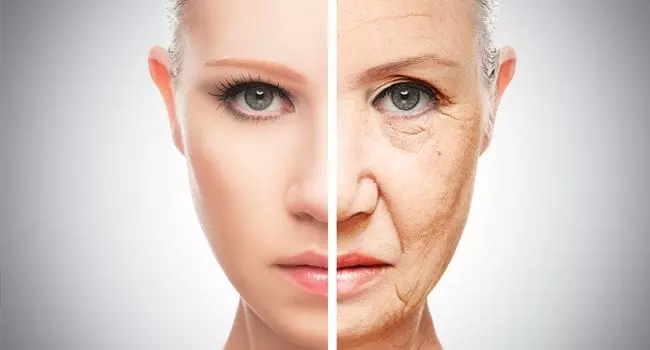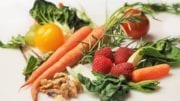Eating right is important at any age. But when you are in your 60s or older, it can be even more vital to improving and maintaining your health. Here are Ten Tips for Healthy Eating as you grow older.
1. Eat a diet rich in nutrients, but lean in fat and calories.
As your appetite decreases with age, your nutritional needs increase. That is why it’s so important to make every meal a healthy meal.
- Follow the dietary guidelines for older mature adults in the food pyramid.
- Eat at least five fruits and vegetables a day, generous portions of whole grains and legumes, and lots of dairy products.
- If chewing has become challenging, choose cooked or canned versions of raw fruits and vegetables.
Sample Meal Plan
| Breakfast | 8 oz. (1 cup) raisin bran8 oz. (1 cup) skim milk
1 banana 8 oz. (1 cup) orange juice |
| Lunch | Bowl of lentil-rice soupTuna salad sandwich on whole wheat bread
Cole slaw Sliced peaches with yogurt |
| Dinner | Broiled salmon or other fishMashed potatoes
Steamed broccoli Tomato and lettuce salad with olive oil and vinegar Cantaloupe |
| Snack | MilkWhole grain crackers with peanut butter |
2. Protect your immune system.
Choose the following foods to help build the immune system, fight infection and ward off chronic disease. They are rich in vitamin E, B6, zinc and vitamin C.
- Green leafy vegetables
- Whole grains
- Fish and other seafood
- Lean meats
- Moderate amounts of olive and canola oils
3. Keep your bones strong.
 Bones weaken with age. To help keep them strong, choose dairy products that provide plenty of calcium, phosphorus and vitamin D. The daily amounts of vitamin D recommended by the National Academy of Sciences are:
Bones weaken with age. To help keep them strong, choose dairy products that provide plenty of calcium, phosphorus and vitamin D. The daily amounts of vitamin D recommended by the National Academy of Sciences are:
- 400 IU if you are between 51 and 70
- 600 IU if you are 70 or older
4. Keep your digestive tract healthy.
You may lose muscle tone in your digestive tract as you age; this makes good bowel habits especially important. Try to eat 20-35 grams of fiber a day by choosing from these foods.
- Oats
- Wheat bran cereals
- Legumes
- Whole grain bread
- Plenty of fruits and vegetables
5. Take care of your eyes.
Cataracts can be prevented by anti-oxidants. The following list contains the foods highest in these anti-aging nutrients, as well as in other carotenoids and vitamin C.
- Citrus fruits
- Tomatoes
- Orange and yellow-green vegetables
- White and sweet potatoes
- Onion
- Garlic
- Grapes
- Carrots
- Cabbage
- Broccoli
- Soybeans

6. Reduce your risk of heart disease and cancer.
A healthy diet is an important part of keeping yourself heart-healthy and avoiding the risk of cancer. It is often a matter of simply eating less of some foods and more of others.
- Limit your intake of saturated fats from fatty meats, cheese, butter and commercially baked goods.
- Eat plenty of fruits and vegetables to get potassium, B6 and folate.
- Make produce a major part of your diet to help reduce the risk of heart disease and cancer.
7. Achieve a healthy body weight.
As you age, your muscle mass decreases; therefore, you need fewer calories to maintain your weight.
- Reduce your calorie level to avoid slowly gaining weight as you get older.
- Maintain a healthy weight to decrease your risk of heart disease, arthritis, cancer and other diseases.
- Keep the extra weight off to avoid developing mobility problems.
8. Eat enough protein.
Marginal levels of protein intake in older adults can compromise lean body mass, immunity and strength. The recommended daily amounts are:
- At least 50 grams of protein a day for women
- 65 grams of protein a day for men
9. Consider a multivitamin.
As you get older, it becomes more challenging to meet all your nutritional needs adequately. That is where multivitamins come in.
- Multivitamins can help with the challenge of meeting increased nutritional needs at the same time that you may be trying to cut back on calories.
- Your ability to absorb nutrients may decline with changes in stomach acid and digestive metabolism; a multivitamin can be a good backup.
- You may need the extra calcium in multivitamins if you are not getting at least three servings of milk per day.
- The extra folic acid, vitamin E and vitamin C in multivitamins can help provide cardiovascular protection.
10. Exercise.
Exercising regularly can slow the aging process. (And not exercising can speed it up.)
- Three 30-minute sessions of walking, swimming, biking or another aerobic activity per week are important for cardiovascular health.
- Strength training will maintain and even rebuild muscle tissue, no matter what your age.
- Exercise will keep you strong and independent.
To prevent dehydration, drink eight 8-oz. glasses of water a day.





Be the first to comment on "Ten Tips for Healthy Eating as you get Older"